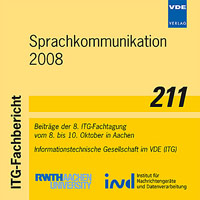Aspects of Speech-Quality Assessment
Conference: Sprachkommunikation 2008 - 8. ITG-Fachtagung
10/08/2008 - 10/10/2008 at Aachen, Germany
Proceedings: Sprachkommunikation 2008
Pages: 4Language: englishTyp: PDF
Personal VDE Members are entitled to a 10% discount on this title
Authors:
Gierlich, H. W. (HEAD acoustics GmbH, Ebertstr. 30a, 52134 Herzogenrath)
Heute, U. (Institute for Circuit and Systems Theory, Christian-Albrechts-Univ. Kiel, Kaiserstraße 2, 24143 Kiel)
Möller, S. (Quality and Usability Lab, Deutsche Telekom Laboratories, TU-Berlin, Ernst-Reuter-Platz 7, 10587 Berlin)
Abstract:
We consider the quality assessment of a speech signal which has been influenced by a transmission or processing system, mainly in a telephone context. The basis of speech-quality assessment is a good understanding of the speech generation process as well as of the human perception and judgment processes involved in a quality rating. The a-priori knowledge of humans, their inherent knowledge about the structure of speech and the speaking behaviour is mainly important in this context. Furthermore it is essential to understand the human hearing process. All instrumental methods describing the human sensation of speech quality should be based on this knowledge as much as possible. Any such (so-called “objective”) model has to be developed and validated based on the results of auditory (so-called “subjective”) tests. Auditory test procedures as well as different types of instrumental assessment including quality attributes are introduced, and hints are given to ongoing basic research and various application fields.


